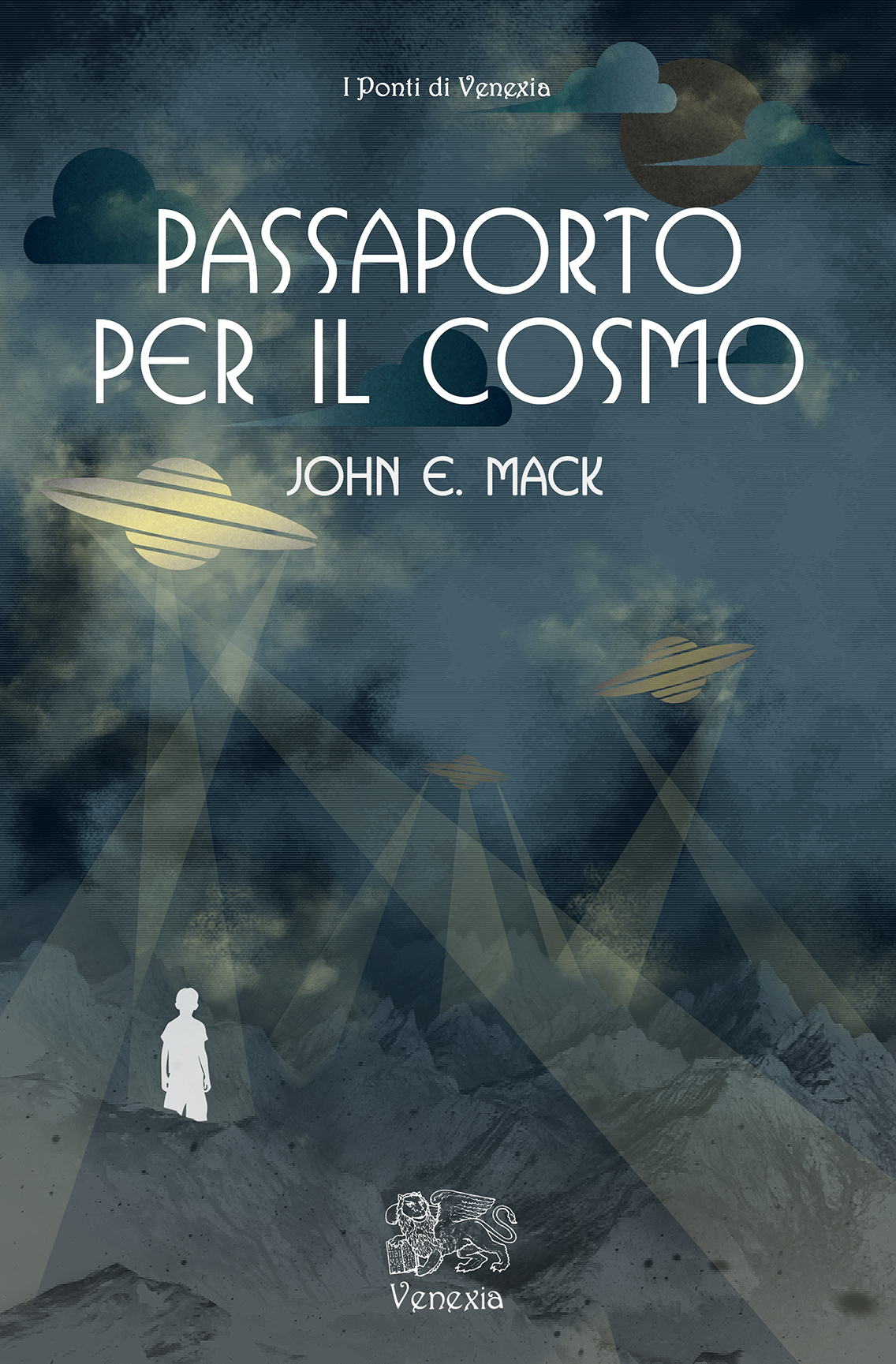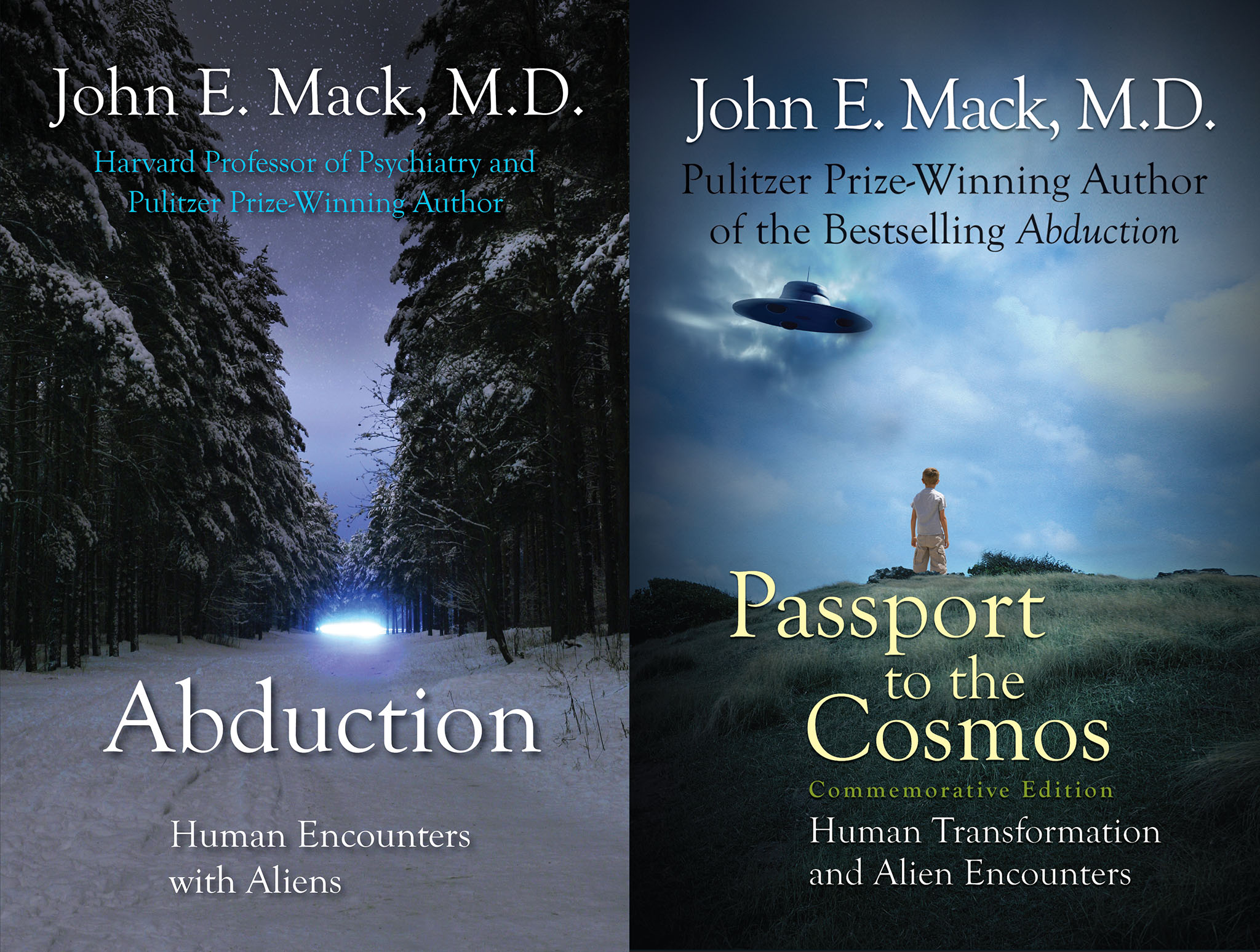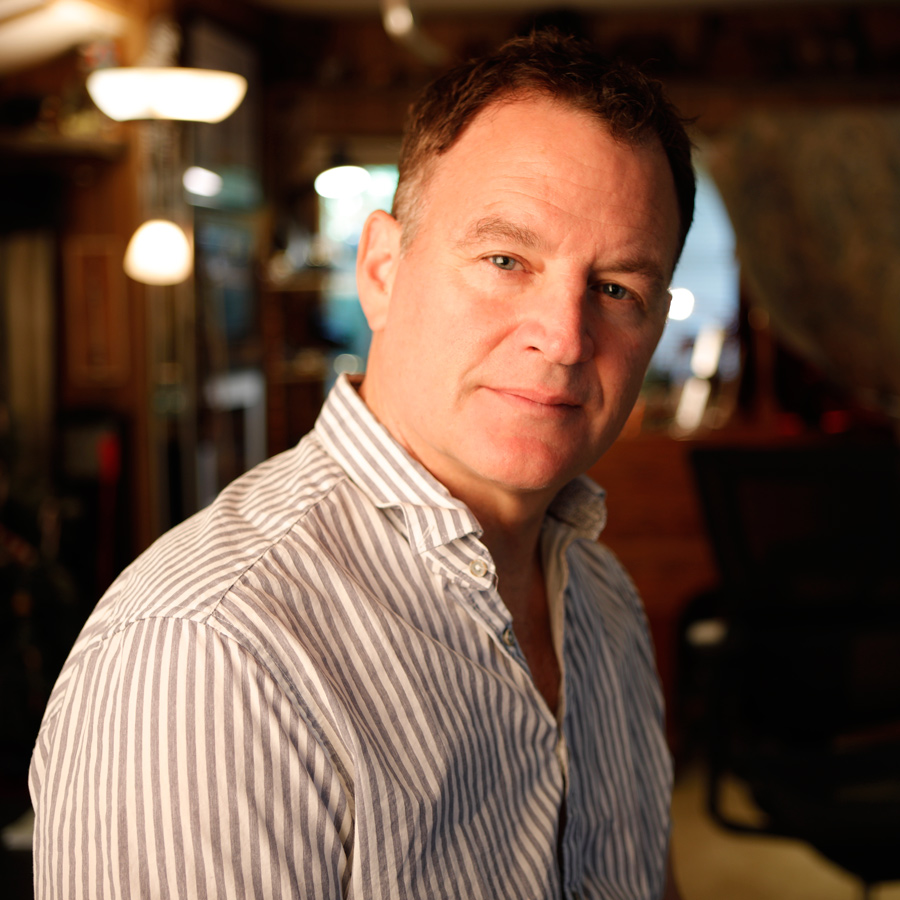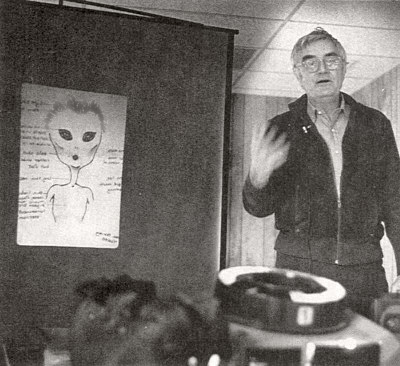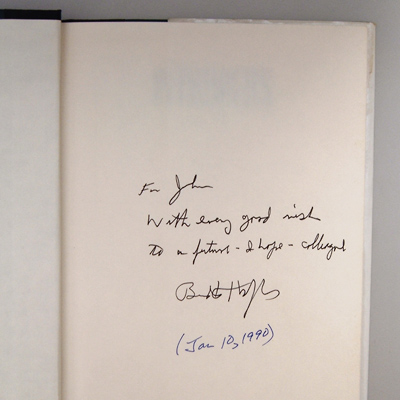On June 4, 2005 at a confernece in Liverpool, Professor Chris French gave a presentation on the alien abduction study undertaken by him and his team at Goldsmiths College, University of London.
On this page we present:
- French’s abstract (from the soon-to-be-published paper);
- a comment from the John Mack Institute written in advance of French’s presenation;
- NEW: an update with an excerpt from French’s conclusions;
- a summary of French’s presentation by Nick Pope
- a response to Pope’s summary by Will Bueché of the John Mack Institute;
- NEW: an audio comment from John Mack (from the archives)
Psychology and parapsychology of the alien contact experience
Christopher C. French, Julia Santomauro, Victoria Hamilton, Rachel Fox & Michael Thalbourne Goldsmiths College, University of London & University of Adelaide
Abstract — Recent systematic research has supported previous anecdotal observations that those reporting alleged alien contact (known as ‘experiencers’) report a much higher incidence of ostensibly paranormal experiences and higher levels of paranormal belief than those not claiming such contact. The results of a study of a UK-based sample of experiencers are presented. Specifically, the project focussed upon quantitative and qualitative data relating to postulated psychological differences between experiencers and non-experiencers (with respect to fantasy-proneness, dissociativity, sleep paralysis experiences, and history of paranormal/anomalous experiences). Furthermore, data were collected pertaining to susceptibility to false memories using a word list paradigm. Finally, data were collected relating to possible paranormal abilities (ESP and PK) in experiencers and a comparison control group. The implications of the results are discussed.
Comment from the John E Mack Institute
(not part of the above):
Professor Chris French, Head of the Anomalistic Psychology Research Unit (APRU) at Goldsmiths’ Psychology Department, stated in the original press release for this study that “Abductees report a wide range of experiences; the research project aims to test not only the psychological aspects of the abduction experience, but also to find out more about the other kinds of experiences that abductees report, and includes some tests for psychic abilities.”
That this study recognizes and seeks to understand these factors is a significant advancement in alien encounter research. In the past, other studies have approached these factors with disdain. A study at Harvard Medical School by Richard J. McNally a few years ago suggested that the range of extraordinary experiences reported by experiencers was evidence that such people were fantasy prone — rather than considering that extraordinary phenomena and alien encounters may be related.
French’s study may have taken us another step towards identifying what kind of people are more likely to perceive and recall alien encounters. However, since the existence of psychic phenomena is often considered to be as unlikely as alien encounters, this is unlikely to settle the debate about whether or not such encounters are real.
Professor French is editor of a UK quarterly titled “The Skeptic,” which may give some indication about how the information will be presented.
An earlier paper of French’s from 2002 begins “Many thousands of people around the world firmly believe that they have been abducted by alien beings and taken on board spaceships where they have been subjected to painful medical examination. Given that such accounts are almost certainly untrue, four areas of neuroscience are considered with respect to possible clues that may lead towards a fuller understanding of the alien abduction experience…” (emphasis added).
French’s website further opines “UFOs and alien abduction” and a range of other extraordinary experiences such as ESP “can be plausibly explained in non-paranormal terms.”
We hope to find out more about the presentation after June 4th.
Update with Professor French’s Conclusions
A summary of French’s presentation was distributed in late June 2005 to select readers, however we cannot present the data until such time as the paper is accepted for publication. French’s conclusion reads as follows:
In general our results are consistent with those psychological models of the alien encounter experience that posit that such anomalous experiences may be a reflection of problems with reality monitoring (Johnson & Raye, 1981), that is, our ability to distinguish between events which take place out in the real world and those that occur only in our subjective mental space (via imagination, fantasy, dreams and so on). Modern theories of both hallucinations and false memories are often conceptualised in terms of problems with reality monitoring. Absorption, dissociativity and fantasy proneness have all been shown to be correlated with susceptibility to false memories (French, 2003). However, these results by no means prove that such explanations are correct. At least two other explanations of the psychological profile of experiencers would have to be ruled out first. The first is that a particular type of psychological profile is required if one is to be psychologically open to experiencing genuine paranormal and related phenomena (such as alien encounters), if indeed such phenomena genuinely exist. The second possibility is that the psychological profile that we see in the experiencers is a consequence of their experience and not a causal factor at all.
We would like to thank Professor French for including these possibilities (in the latter part of his conclusion). His honest analysis of the meaning of his hard data stands in marked contrast to the manner in which other researchers have presented their data. This forthrightness is the reason why even research by an avowed skeptic such as French can be of great value. The alternate possibilities French refers to seem to us at the John Mack Institute to be the possibilities that will someday be recognized as true.
Summary of Preview Event by Nick Pope, and Response by JEMI
Summary provided to UFOUpdates list by Nick Pope; Reproduced here for informational purposes only.
From: Nick Pope
Date: Sun, 5 Jun 2005
Subject: Chris French Abduction Study Results
I’ve posted previously on this List information relating to the scientific study into alien abductions conducted by Professor Chris French at Goldsmith College, University of London.
As previously notified, Professor French presented a paper on this at a conference in Liverpool on Saturday.
Chris forwarded me a copy of his paper, but asked me not to post it for now, as this might cause problems with subsequent publication in scientific journals. He did, however, say that I could post a summary of the paper. I’m wary of this, as I’m not a scientist, but I think I can safely say the following:
The study involved 19 abductees (8 male, 11 female) and a control group matched by age and gender. The study looked for postulated psychological differences between the two groups, for differences in susceptibility to false memories, and for differences in ESP and PK abilities.
Significant differences were found in areas such as tendency to hallucinate, absorption and dissociative tendencies.[1] The results were less clear on fantasy-proneness, while no significant differences were found on susceptibility to false memory.[2]
Greater incidence of sleep paralysis was found among the abductees, though it was acknowledged that this might be a symptom of, and not an explanation for, alien abduction.[3]
The tests on paranormal abilities did not appear to show any significant differences, though there was one apparent difference on the clairvoyance test, which I’m attempting to clarify.
Once the paper’s been published in scientific journals, I’ll post it to this List, provided Professor French is content.
Best wishes,
Nick Pope
Response to Nick Pope’s Summary of Chris French’s Study Results
by Will Bueche, The John E. Mack Institute (JEMI)
Back in the 1950s and early 1960s when people thought about alien encounters, they imaged silver metallic saucers traveling across interstellar space and landing in the Mojave Desert in California. They imagined ambassadors from other worlds would contact mankind. That was more or less what the culture expected could happen. But it isn’t what happened. In fact, what people describe is far stranger.
What people are in fact experiencing today is not a straightforward visit from an alien who steps out from a silver saucer. Instead, people describe something a bit more surreal, involving the appearance of a bright light that either descends from the sky (or if one is indoors, light that fills the room yet seemingly comes from nowhere & everywhere), a sense that time is being distorted, the arrival of strange beings who pass directly through walls and communicate telepathically, and other exceptionally strange sensations of vibration, of being moved into an alien environment and later returned.
These strange descriptions, and the lack of any direct physical evidence (no alien artifacts), have led modern day researchers to consider the possibility that what people are describing may be more akin to a meeting of worlds or dimensions, rather than a visit from another planet. Something which by its very nature cannot leave traces, only memories.
Naturally, there is a predisposition in our culture to assume that an experience that leaves no physical evidence must be an illusion. Lacking any technology which can explore other realities (or even prove that other dimensions posited by physicists even exist, let alone contain life forms), research has turned to the minds of the experiencers themselves to see if their minds possess any particular qualities which might account for why they have perceived something which may seem, on the face of things, to be unreal.
Regrettably, those conducting this research have often carried an assumption into their work; an assumption that if any personality differences in experiencers are uncovered, that these differences may imply that their perceptions can be dismissed as illusions.
For example, most everyone who has looked at alien encounters notices a similarity between alien encounters and the natural illusions that occur in the states of consciousness that exist between waking and sleeping. Particularly, the sense that something vaguely threatening is in one’s room, and the sense that things are a bit odd. Often those who note this similarity do so because they believe that alien encounters are examples of these sleep related fantasies.
But there are also cultures who believe that altered states of consciousness – such as the states one cycles through when meditating – are conducive to the perception of other aspects of reality beyond the material world. A person meditating may experience what they describe as a connection with the spiritual world, but there’s no way to prove that such a world exists even if many people perceive it!
Nonetheless, because many people have perceived it (the sense that the world includes more than the physical plane), most every culture believes the world is a continuum of the physical and something else which theologians dubbed the spiritual, for lack of a better word. Today we wonder if it might be what physicists such as Michael Greene call other dimensions, but science still has a very long way to go to catch up with these theories.
The late Harvard psychiatrist Dr John Mack asked us to consider the possibility that alien encounters might be experiences in which something from beyond the material world is “crossing over” into our world, but which is not native to our reality and may therefore may require an altered state of consciousness to even perceive it.
Dr Remo Roth in Switzerland suggests that when the so-called aliens cross over into our world, they affect not only the physical environment (causing the odd lights and the feeling of vibration) but also affect the state of consciousness of the people to whom it is occurring. He suggests that people are being forced to perceive something which is normally beyond our range of perception.
When one looks at studies of the minds of experiencers, one needs to be mindful of the possibility that if there are character traits that are different from average, these differences may be qualities which have enabled these people to perceive and recall their experiences, rather than assume that these character traits somehow implies that their experiences are not real.
Here then are some brief comments in response to Nick Pope’s summary of Christopher French’s presentation:
[1] “Significant differences were found in areas such as tendency to hallucinate, absorption and dissociative tendencies.”
Regarding the “tendency to hallucinate,” we must be wary that the researcher may be defining every visual or auditory element related to alien encounters — such as bright light at the onset of an alien encounter, telepathic communication, associated experiences such as seeing auras around people, and the very sight of aliens themselves — as hallucinations.
Such a definition would lead to circular reasoning in which the researcher fulfills his own expectations (as in “I assume aliens are hallucinations, therefore anyone who tends to see aliens must have a tendency to hallucinate.”)
If on the other hand the researcher has found that the experiencers also report hallucinations of things which are known to be unreal (visits by Bugs Bunny, for instance), that will need to be studied further.
Less prone to the possibility of researcher bias is the part of the statement referring to a tendency towards “absorption and dissasociate tendencies.” That French has again found experiencers to score higher in this quality raises provocative questions.
Similar results have been found by researchers who believe that alien encounters may be real. A study of 40 experiencers and 40 control subjects conducted in the 1997 by John Mack’s organization PEER (but left unpublished) found that “experiencers show moderate dissociative capacities (lower than pathological norms) and high absorption.” PEER’s report explained the terms:
“Dissociation and absorption are two personality characteristics related to entering altered states. Dissociation is an ability to split off certain mental processes from the main body of consciousness with various degrees of autonomy. Absorption is a personality style which denotes the degree to which an individual’s attention can remain absorbed cognitively in sensory stimuli or daydreams. Thus, dissociation seems to mark an ability to enter altered states, while absorption seems to relate to an ability to maintain consciousness in that altered state.”
“Absorption,” although sounding as if it may be a term for some kind of frightening condition, is in fact not a reference to a character flaw at all. Rather, absorption is a person’s ability to enter into or become “one” with an experience; to fully engage an experience so that it is felt to be a living part of yourself. It is a quality associated with spiritual or meditational practices.
That experiencers score higher in this trait may again indicate that alien contact is a more intimate form of connection with another world than our culture may have expected.
Most psychiatrists believe that “dissociation”, the ability to disengage from or isolate one’s feelings or awareness of particular experiences, is a coping mechanism formed in response to having lived through events which were exceptionally traumatic.
That experiencers in French’s study were evidently more dissociative than average will likely not be seen as evidence that their reports of terrifying alien encounters, recurrent since childhood, may be accurate. Rather, we expect the report will suggest that experiencers’ dissociative tendencies may have been caused by a more convential form of trauma, such as undocumented childhood sexual abuse, and that the people later erroneously came to believe their dissociative tendencies could be explained by alien encounters. (The familiarity of this debate is realized in the new motion picture “The Mysterious Skin,” which features a character who believes he was abducted by aliens as a child when he was in fact sexually abused by his little league coach).
[2] “no significant differences were found on susceptibility to false memory.”
This may be a reference to a word-list experiment in which a group of thematically related words are presented to the subject, who is then asked (after a suitable period of distraction) to try to recall as many of the words as they can — and to also indicate how confident they are in their recollection. For example, a list might include words such as “sheets, pillow, comforter, blanket, teddy bear.” When this word-list experiment was conducted at Harvard Medical School a couple years ago by doctorial student Susan Clancy, she found that experiencers tended to have more errors, and to express a higher confidence in their erroneous answers. For example, the experiencers may have stated with confidence that the word “bed” was on the list, even though it was only the concept of “bed” and not the word itself which appeared in the list. This tendency was used by Clancy to suggest that experiencers were more prone to creating “false memories.” However, more established experts in memory dismissed the suggestion that rote recollection of word lists can be compared to the creation of experiential memories in real-life situations.
That the replication of this experiment has failed to detect what Clancy detected is puzzling; had the results matched, it would have further strengthened the possibility that people who report alien contact tend to process information conceptually rather than in words. These people may have a greater ability to perceive and later attempt to describe experiences which may exceed what language is designed for (the difficulty people have in describing in what reality alien encounters take place is a good example of where language breaks down).
[3] “Greater incidence of sleep paralysis was found among the abductees, though it was acknowledged that this might be a symptom of, and not an explanation for, alien abduction.”
Some suggest that alien encounter experiences are fantasies experienced during naturally occurring altered states of consciousness, such as those which transpire between sleep and wakefulness. During these hypnagogic or hypnopompic states the physiological process of sleep paralysis (a restriction of movement which our bodies enact during rest so as to prevent our limbs from reacting to illusory events in dreams) experienced in concert with hallucinations derived from imagination and cultural material, and perhaps accentuated by dreams, creates the impression in some people that an extraordinary event has taken place in reality.
Others suggest that naturally occurring altered states of consciousness, such as those which transpire between sleep and wakefulness, may facilitate perception of or contact with another aspect of reality—such as what in traditional theological terms is described as the “spiritual” world (see Sherwood, Simon J. “Relationship between the hypnagogic/hypnopompic states and reports of anomalous experiences” Journal of Parapsychology, The, June 2002).
While different states of consciousness are entered into purposefully by meditators, shamans, other spiritual practitioners, it should not be overlooked that everyday men and women also pass through different states of consciousness. A greater incidence of sleep paralysis among experiencers may indicate that they experience natural altered states of consciousness more frequently than average, or recall their altered states more acutely than average.
While a higher incendence of sleep paralysis among experiencers neither proves that the experience of alien contact is real, nor proves that it is fantasy, it may support the theory — held by both skeptics and believers of alien contact — that altered states of consciousness are involved in the alien encounter experience in some way.
A Comment from John Mack: From the Archives
I think that the mind that has visions is very close to the mind that can have these experiences. [Even though] conventional psychological studies don’t distinguish abduction experiencers from other folks, there are differences. And one of them is this kind of openness to visionary experience. Either because people were already that way, or because the experiences opened them to a visionary kind of consciousness. A lot of times the experiences seem to begin in hypnagogic states, but that doesnt mean they are dream states, that would be a mistake [to assume that].
— Dr John Mack at Oberlin College, 2001
